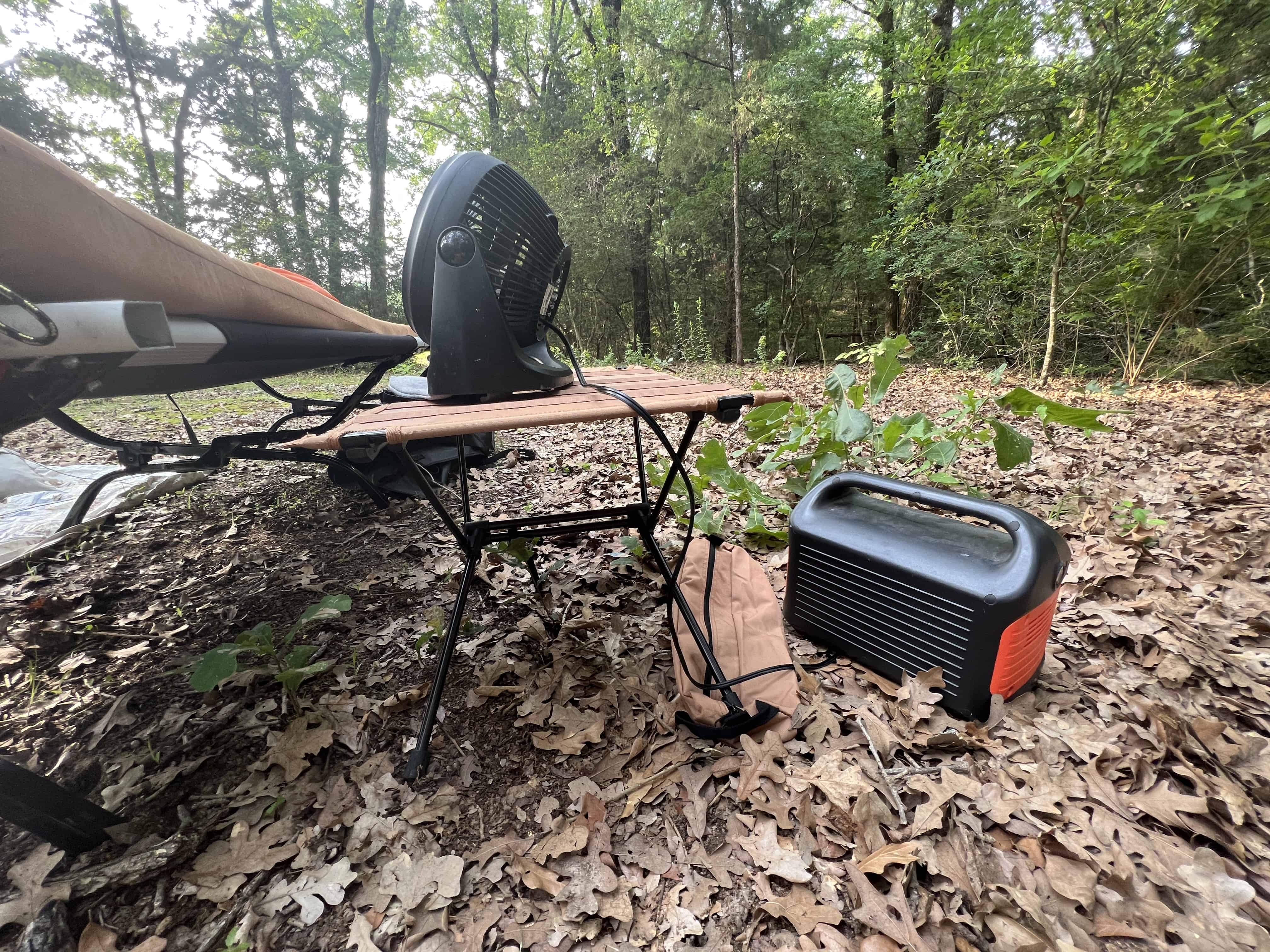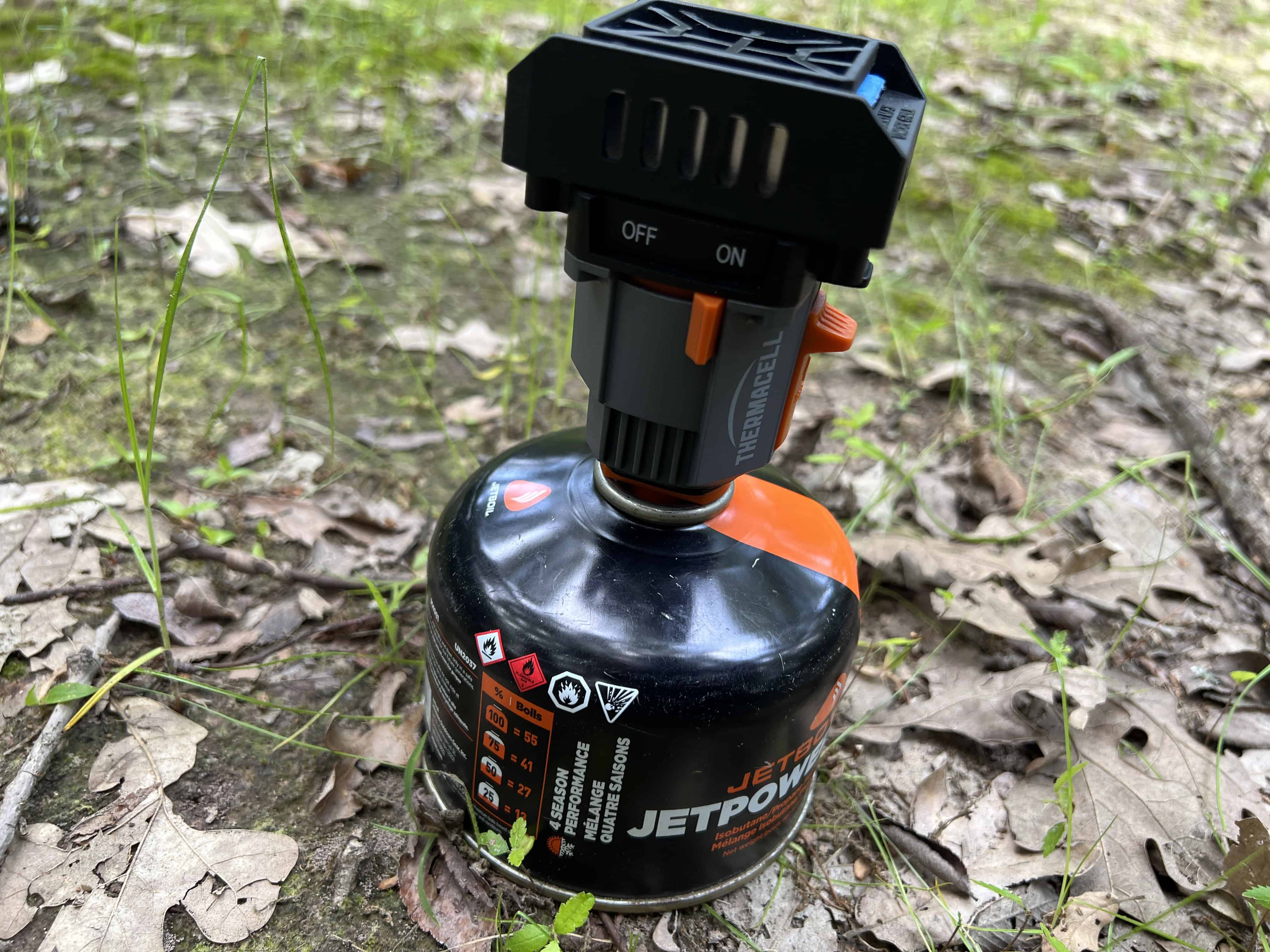How To Stay Cool While Tent Camping In The Summer
If you click and purchase with one of our links, we earn a commission. Thanks.

Use fans, camp showers, and even portable AC to keep yourself cool while summer tent camping. It’s also important to dress properly and bring bug spray to keep the insects away.
If you are new to camping start with this article.
Bring Fans
When it comes to camping in the summer, the heat can be quite challenging to handle. But fear not, for there are ways to stay cool and comfortable even in the hottest of conditions.
One such strategy is to bring fans along with you on your camping adventure. Fans can provide much-needed relief from the sweltering heat by circulating air and creating a cooling breeze.
There are various types of fans that you can consider bringing on your camping trip. Battery-operated fans are a popular choice as they don’t require electricity and are portable.
These fans come in different sizes, ranging from small handheld ones to larger table fans. You can even find some battery-operated fans that have built-in misting features, providing an extra level of refreshment.
Another option is using rechargeable USB fans that can be powered by portable chargers or solar panels. These versatile fans are lightweight and compact, making them perfect for camping trips where space might be limited.
If you have access to electricity at your campsite, you could also bring an electric fan or a small plug-in fan if your tent has an outlet. Just make sure to check the campground’s policies regarding electrical devices before assuming it’s allowed.
To maximize the effectiveness of your fan, position it strategically within your tent. From a physics standpoint you should point a fan away from you.
But if you want a fan to cool you off, point the fan at you. The fan will blow the sweat off your body and this will help you feel cooler.
If possible, consider elevating the fan off the ground using a makeshift stand or hanging it from above to ensure better air circulation.
Furthermore, keep in mind that while fans can provide some relief from the heat, they won’t lower the temperature inside your tent significantly if it’s scorching outside.
To keep your tent cool throughout the day and night, employ additional methods such as shading your tent with tarps or setting up camp under trees for natural shade
. So whether you’re planning on lounging in your tent reading a book, enjoying a leisurely afternoon nap, or even watching movies or TV shows, bringing fans with you can make your camping experience far more enjoyable.
Keep Yourself Wet
On a group campout to Inks Lake State Park it was almost 100 during the day. We had driven over four hours to get to the campsite and were not going to bail just because it was hot during the day.
The park did cool off at night so we just had to figure out how to stay cool during the day.
The best tip I have even been given has been “keep yourself wet.” This means literally keeping yourself soaked like you are living in a car wash.
If you have lakeside access, stay in the lake. And before you go to bed, take a shower in your clothes. Let your body cool off with evaporation.
My friend Randall brings sprinklers to his campsite for his family to run through. Check with your local park if that is allowed.
Another clever trick is to use damp towels or bandanas as makeshift cooling devices. Simply wet them with cool water from a nearby stream or campsite faucet (if available) and drape them over your neck, and forehead, or even wrap them around your wrists.
The evaporation will work its magic, creating an instant cooling effect that will make you feel like you have your very own mini oasis right there in the wilderness. If you want to take things up a notch and have access to electricity at your campsite, consider investing in a portable misting fan.
These fantastic gadgets combine the power of air circulation with refreshing mist sprays to keep you cool as if you were lounging poolside at an upscale resort. It’s like having all the comforts of modern technology while still enjoying nature’s breathtaking beauty.
But what if you’re camping off-grid and don’t have access to electricity? Fear not!
First, Riboyi makes a fantastic battery-powered misting fan. I have used this on every warm-weather non-backpacking campout for the past three years.
Consider bringing along some ice packs or freezing bottles of water ahead of time.
Not only will they help chill any beverages you bring along for those cozy evening campfires, but they can also be used to cool you down.
Place a frozen water bottle against your pulse points or wrap an ice pack in a towel and use it to cool off your face and neck whenever needed.
So, whether you decide to rely on a trusty spray bottle, damp towels, portable misting fan, or some creative ice pack usage, keeping yourself wet while camping in the summer will help you beat the heat and enjoy your outdoor experience to the fullest.
Embrace the refreshing power of water as your personal cooling companion and watch as it transforms your sweltering summer adventure into an oasis of comfort and relaxation.
Prepare Your Tent For Hot Summer Camping

When it comes to camping in the hot summer months, preparing your tent to ensure a comfortable and cool environment is crucial.
One of the first things you can do is choose a shady spot to set up your tent, preferably under a tree canopy or next to a natural shade source.
This will help keep the direct sunlight away from your tent and maintain cooler temperatures inside. Additionally, you can consider using reflective tarps or sunshades on top of your tent for added protection against the scorching sun.
Another handy tip is to create airflow within your tent by strategically positioning windows or vents. Keep them open during the day to allow hot air to escape while encouraging a constant breeze inside.
Utilizing portable fans can also be highly effective in circulating air and preventing stuffiness. If you don’t have access to electricity at your campsite, worry not!
There are battery-operated fans available that can keep you cool without relying on electricity.
To further enhance comfort during hot summer camping, invest in insulating materials such as thermal blankets or window coverings that can prevent excess heat from entering your tent.
These items are relatively inexpensive and easy to install but can make a significant difference in keeping temperatures down. If you have access to power sources like solar panels or generators, consider bringing along a small portable air conditioner unit specifically designed for camping purposes.
Companies like Ecoflow and Zero Breeze make air conditioners intended for tent camping.
With these preparations in place, you’ll be able to enjoy peaceful nights of sleep and rejuvenating downtime inside your well-equipped and comfortably cool camping haven.
Bring A Battery Generator
Generators have been a part of camping for decades. Initially, if you wanted a generator it required gasoline, oil, or propane.
Now you can get battery-powered generators that you can recharge with solar panels. A popular brand is Jackery but there are many others.
I was introduced to Jackery because one of my friends uses a Jackery to power his CPAP machine.
I use my Jackery to power my USB fan and charge my phone. It has lasted the weekend without needing to recharge it.
Invest In A Camping AC Unit
You can now by actual HVAC units designed for tent camping. Unlike swamp coolers that blow ice water and don’t work well in high humidity, these work like your home AC.
I know that using a AC unit on a campout will destroy the concept of a rustic getaway but if you can only camp once a year and it’s in the summer, you gotta do what you gotta do.
I see no shame in using an AC unit in your tent if you have the space, power, and can afford it because these systems aren’t cheap.
Hopefully, you are able to actually get out of your tent during the cooler parts of the day but, it’s your tent and do your own camp.
Don’t Forget The Bug Repellent Now, let’s move on to a crucial aspect of camping in the summer: bug repellent. There’s nothing worse than being constantly bothered by mosquitoes and other pesky insects while you’re trying to enjoy the great outdoors. So, when you’re packing for your summer camping trip, don’t forget to bring some reliable bug repellent.
Mosquitoes are especially prevalent during the summer months when their populations thrive. To ward off these tiny bloodsuckers, choose a bug spray or lotion that contains ingredients like DEET or picaridin.
These chemicals effectively repel mosquitoes and provide you with much-needed protection. When applying bug repellent, make sure to cover exposed skin areas such as arms, legs, and neck.
Don’t forget about those hard-to-reach places like behind your ears or on your ankles! For added protection, consider wearing long-sleeved shirts and pants made of lightweight and breathable fabrics.
In addition to applying bug repellent directly to your skin, there are other measures you can take to keep bugs at bay while camping.

Thermacell has become the consistent go-to product for keeping mosquitoes away. Thermacell uses the active chemical from citronella candles to keep mosquitoes away. Similar to a citronella candle, you put the device on a table or the ground and it provides an invisible shield.
I currently use the model they came out with in 2022 that uses an isobutane canister for fuel and is designed for backpacking.
But they make larger models that are perfect for car camping family adventures.
Furthermore, it’s essential to maintain a clean campsite by eliminating any standing water sources where mosquitoes are likely to breed. Emptying rainwater from buckets or containers regularly will help minimize their presence.
If you prefer natural alternatives or want additional protection against ticks and other pests, try using essential oils such as lavender oil or tea tree oil. These oils have repellent properties that can be effective in certain situations but may need more frequent reapplication compared to commercial insect repellents.
Remember that different regions may have specific pests or insect challenges unique to their environment. Therefore, it’s always a good idea to research the local insect population before heading out on your camping adventure and come prepared with the right type of bug repellent for the area.
By incorporating bug repellent into your camping routine, you can ensure a more enjoyable and comfortable experience in the great outdoors, free from constant buzzing and itchy mosquito bites. So, don’t forget to pack your bug repellent along with other camping essentials to stay protected during those warm summer nights.
Dress Properly
When it comes to camping in the summer, dressing properly for hot weather camping is essential for staying comfortable and protected from the sun’s rays. Opt for lightweight, breathable fabrics like cotton or linen that allow air to circulate.
Loose-fitting clothing will help keep you cool by allowing sweat to evaporate more easily. Remember to wear a wide-brimmed hat or a baseball cap to shield your face from direct sunlight.
Sunglasses are also a must-have accessory to protect your eyes from harmful UV rays. Additionally, consider wearing moisture-wicking socks and shoes designed for hiking or outdoor activities. These will help keep your feet dry and prevent blisters caused by sweat and friction. It’s important to choose footwear that provides adequate support and traction, especially if you plan on embarking on hikes or exploring the surrounding area.
Another crucial aspect of dressing properly for summer camping is layering your clothing. While the days can be scorching hot, temperatures can drop significantly during nighttime or if you find yourself in shaded areas.
By layering, you can easily adjust your clothing according to temperature changes throughout the day. Don’t forget about swimwear!
Packing a swimsuit is not only practical for cooling off in nearby lakes or swimming holes but can also be used as an emergency option if you need to rinse off sweat or refresh yourself with a quick dip. Remember, staying comfortable and cool while camping in the summer starts with choosing the right clothing options that prioritize breathability, sun protection, and adaptability throughout changing temperatures - not just while lounging around camp but also when engaging in outdoor activities such as hiking or exploring nearby trails.
Setup Camp In The Evening
When it comes to setting up camp in the summer, timing is everything. One of the best tips for beating the heat is to aim for setting up camp in the evening. This way, you can take advantage of the cooler temperatures and avoid the scorching heat of midday.
Ideally, you should start pitching your tent a couple of hours before sunset when the sun begins to lose its intensity. As you select your camping spot, try to find an area with plenty of shade provided by trees or natural structures.
This will help keep your tent cool throughout the day. Once you have chosen a suitable location, be sure to position your tent so that it is sheltered from direct sunlight during the hottest parts of the day.
By strategically placing your tent in a shaded area, you can lower its internal temperature significantly. To further enhance your camping experience during hot summer nights, consider investing in some essential gear.
Portable fans that run on batteries are excellent for circulating air within your tent and providing a cooling breeze as you sleep. Alternatively, if you have access to electricity at your campsite, an electric fan would work just as well.
Additionally, if you’re looking for ways to keep food and beverages cool without relying on electricity or ice alone, consider investing in a high-quality cooler like the Yeti Tundra. These heavy-duty coolers can retain ice for days and ensure that perishable items stay cold even in sweltering temperatures.
Bring An Umbrella
Any light-colored umbrella will work but I like ones with a mylar outer coating that can reduce temperatures by 10 degrees.
I always pair my misting fan with my mylar umbrella. I look goofy but I’m comfortable, even in the mid-90s.
The umbrella can also be used to keep you dry if it starts to rain. A friend who hiked the entire Pacific Coast Trail swore by using an umbrella on the trail.
Cool Off With A Survival Blanket
In the 1970s NASA invented a material to protect spaceships from the excessive heat from sunlight in space called mylar. It is thin, lightweight, malleable and reflects 95% of the infrared rays.
The man who invented it also ran marathons who discovered that a lot of marathon runners were suffering from hypothermia after races and discovered that blankets made from mylar would save their lives.
That’s how survival blankets were invented.
Those cheap blankets can be attached to the exterior of your tent with the shiny side pointing to the sky. And they will keep your tent cooler by preventing the infrared rays from reaching into your tent.
You can also attach them to the INTERIOR of your tent during the winter to keep you warmer. That’s because they will be focused on trapping your body heat.
Occupy Your Time With Activities That Get You Out Of The Heat
Sometimes the best thing to do to beat the heat is to find something else to do during the day.
One time, my friend Scott and I went camping at the state park ten minutes from his house. We stayed 2 nights.
On the 2nd day, we knew that it would cool off at night. Down into the 50s but during the day it was 95 without a single spot of shade.
Scott was already going to meet a person at his house at lunch to complete a sale on Facebook Marketplace so we stayed longer and watched a movie.
Another time we were on a campout in south Texas and it got over 90 degrees. But there was a cave tour down the road at Longhorn Cavern. The cavern is 70 degrees year round so we took the tour.
If you run out of options to keep cool at the campsite, look for cheap ways todo indoor activities with working AC (even the local library can be a respite) nearby.